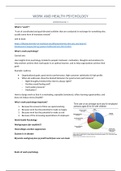WORK AND HEALTH PSYCHOLOGY
HOORCOLLEGE 1
What is “work”?
“A set of coordinated and goal-directed activities that are conducted in exchange for something else,
usually some form of monetary reward”
Link to book
https://tilburguniversity-on-worldcat-org.tilburguniversity.idm.oclc.org/search?
databaseList=&queryString=peeters%20taris#/oclc/853114045
What is work psychology?
Central aim:
Use insights from psychology (related to people’s behavior, motivation, thoughts and emotions) to
help workers achieve their work-goals in an optimal manner, and to help organizations achieve their
goals
Example; waitress
Organizational goals: good service performance, high customer satisfaction & high profits
When do waitresses show the desired behaviors for good service performance?
- Right thoughts/mindset (the client is always right)?
- Positive mood/feeling well?
- (not) under pressure?
- Motivation?
How to design work so that it is motivating, enjoyable (emotions), offers learning opportunities, and
does not induce stress (health)?
Why is work psychology important?
1. Because the amount of time we spend working
2. Because work has the potential to make us happy
3. Because work has the potential to make us sick
4. Because of the increasing expectations of employers
Work Health Psychology
Werkgroepen zijn verplicht!!!
Hoorcolleges worden opgenomen
Examen is in oktober
Bij eerste werkgroep kun je jezelf inschrijven voor een team
Roots of work psychology
,1850 – 1930
Pre-industrial / agrarian ~ 1860, Industrial revolution ~ 1910
Psychotechnics / Applied psychology
Psychotechnics = The practical or technological application of psychology, as in analysis of social or
economic problems.
“[…] the psychological experiment is systematically to be placed at the service of commerce and
industry“ (Münsterberg, 1913)
Pioneers:
Jean Marie Lahy (France, from 1903 onwards)
- experiments on the selection of streetcar operators
- general method for employee selection (normed tests)
Munsterberg (Germany/U.S., 1913)
- “selection of those personalities which by their mental qualities are especially fit for a
particular kind of economic work.” (Münsterberg, 1913)
- Work on the selection of drivers, typists, army gunners, etc.
Scientific management
Country of origin: USA
Founding father: Frederick Winslow Taylor
“As to the importance of obtaining the maximum output of each man and each machine, it is only
through the adoption of modern scientific management that this great problem can be finally solved”
(Taylor, 1911)
Scientific management
Focus on the task (simplification of tasks)
“…in nineteen out of twenty industrial establishments, the workmen believe it to be directly against
their interests to give their employers the best initiative, and that instead of working hard to do the
largest possible amount of work and the best quality of work for their employer, they deliberately
work as slowly as they dare while they at the same time try to make those over them believe that
they are working fast.” (Taylor, 1939)
Workers are lazy
Pig iron handling
Task: loading or piling pig iron (~46kg)
“there is a science of handling pig iron, and […] this science amounts to so much that the man who is
suited to handle pig iron cannot possibly understand it, nor even work in accordance with the laws of
this science, without the help of those who are over him” (Taylor, 1911)
Men are stupid
Scientific management: Solution
, Simplification of tasks
Examine the best way to conduct the tasks
Training workers in the one best way to conduct the tasks
Separating the planning of tasks from their execution
Selecting workers for particular tasks
1930 – now
Human Relations Movement
Hawthorne studies (1924 – 1932)
Human Relations Movement
“From the time of the publication of the results of the Hawthorne Studies onward, no one interested
in the behavior of employees could consider them as isolated individuals. Rather, such factors and
concepts as group influences, social status, informal communication, roles, norms, and the like were
drawn upon to explain and interpret the voluminous data from these studies and other field
investigations that followed them”
Why was scientific management widely applied in the US, but much less in Europe?
Context: In 1880, industrialization in the US was far less advanced than in Europe (Britain, Germany
and France); In the following 30 years it underwent an enormous economic expansion, often at the
cost of individual employees.
This was possible because unions were less powerful than in Europe (could not protect the
workers sufficiently) and because immigrants from Europe often did not have a choice but to
accept work under any condition
Contemporary work psychology
Well-being
“The state of being comfortable, healthy, or happy” (Oxford Dictionaries)
“Health is a state of complete physical, mental and social well-being and not merely the absence of
disease or infirmity.” (WHO)
Well-being at work
Health (physical well-being)
, - Work as a source of disease and injuries, stress, and health benefits
Relationships (social well-being)
- Work as a source of trust, support, reciprocity, exploitation, and power abuse
Happiness (psychological well-being)
- Work as a source of pleasure and satisfaction (passive) and fulfillment / engagement
(active) or the opposite thereof
Performance
“The action or process of performing a task or function”
“A task or operation seen in terms of how successfully it is performed”
Work performance: Action or outcome?
Action: “Performance is what the organization hires one to do, and do well” (Campbell et al., 1993)
Outcome: “The consequence or the result of the individual worker’s behavior” (Sonnentag & Frese,
2002)
Cf. book PdJT, Chapter 13
NB: The book takes a behavioral view on performance, that is, performance as actions
Dimensions of individual job performance
Task performance (proficiency)
Organizational citizenship behaviors (OCB; going the extra mile)
Counterproductive work behaviors
Employee withdrawal behaviors
SUMMARY: During this lecture, we addressed…
…what work psychology is and why it is important.
…the structure, expectations, and goals related to the course ‘Work, wellbeing, and
performance’.
…the roots of work psychology and the core ideas of psychotechnics, scientific management,
the human relations movement, and contemporary work psychology.
…the terms work, well-being, and performance.






